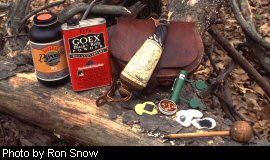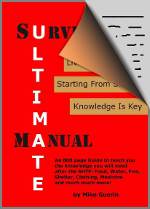How To Make All Natural Black Powder - Survival Manual

The good news is it is very doable. The bad news is that it isn't a simple quick process. There are many recipes and where you live could impact which recipe you choose. Bad news is not all recipes are equal.
First let's talk a bit of unnecessary chemistry and physics. As solids or liquids turn to gas their volume increases greatly. It is simply this volume increase that is so useful with black powder. As it burns its volume increases. But if it doesn't burn fast enough it isn't very useful. Because the volume increase does no good if it doesn't generate high pressures and once the bullet is pushed from your barrel any gunpowder that has not yet burned will be wasted. Explosives are a category of chemicals that react fast enough to be useful in weapons and mining and other things as well. So we are looking to make something that not only burns like dry wood but goes through a similar reaction (yes burning wood is a chemical reaction of wood to gas) in less than a second.
Point here is that all the recipes below will work but some will burn faster than others and you want faster. Ideally you want to use a recipe with sulfur. Sulfur as an ingredient will greatly enhance the rapidity of reaction. And it is the speed of the reaction that is important when talking about firing a gun. Unfortunately for me I live in an area that I am not likely to be able to obtain this ingredient. So my black powder is not going to be as good as someone with access to sulfur.
So before you can make your black powder you need to determine which of the following ingredients you have the ability to make on your own. Here is a list with link on how to make each possible ingredient.
1. Saltpeter aka Potassium Nitrate
2. Charcoal
3. Sulfur
4. Sugar
5. Honey
6. Alcohol
You don't need each of these ingredients. It depends on your recipe. That is simply a list of ingredients for all of the recipes.
Here are some black powder recipes!
Recipe 1:
75 parts of saltpeter
15 parts of charcoal, and (Parts given by weight)
10 parts of sulfur
Recipe 2:
100 parts of saltpeter
24 parts of charcoal
Recipe 3:
45 parts of saltpeter
5 parts sugar
9 parts charcoal
Keep in mind that these ratios are not written in stone. Since each batch of your ingredients is likely to vary it is always a good idea before mixing the ingredients to run some test varying the ratios of the ingredients to find what works best. But these recipes should be a good starting point.
Note: This is just a list of ingredients so far. There is more to the process than just mixing the ingredients.
How to take your ingredients and combine them to make gunpowder!
Step 1: Ball mill each of the ingredients separately.
Step 2: Mix in the proper ratio of sulfur and charcoal.
Step 3: Add isopropyl alcohol to charcoal/sulfur and mix thoroughly.
Step 4: Measure 1/4 cup (40 ml) of water for every 1/2 cup (100 grams) of Saltpeter aka potassium nitrate in an old pan. Add your potassium nitrate. Bring to a boil. Stir continuously. Add little bits of water at intervals until the potassium nitrate is completely dissolved.
Step 5: Add the charcoal/sulfur or sugar mixture to your pot of boiling potassium nitrate, to attain the proper recipe solution. Stir.
Step 6: Add the hot solution to your isopropyl alcohol. Stir together.
Step 7: Let cool. The quicker it cools the better.
Step 8: Filter everything through a cloth to remove all liquid buy squeezing out the liquid.
Step 9: Begin to dry the gunpowder slowly. Do not use artificial heat such as a stove or oven.
Step 10: Press the Black powder through a fine sieve while it is still slightly damp. Then spread the small pellets out to dry completely.
Step 11: Store your black powder in a cool, dry place. Plastic or Glass containers with lids work great.
You are finished... Finally!
*Note You can substitute drinking alcohol or even water for isopropyl alcohol.
*Note The above steps are not the only way to do this. Some simply mix the ingredients and then wet with water, and push through a 16 hole per inch screen when damp. To wet it won't go through the screen. To dry it will not stay clumped.
*Note The object of these steps is to get the potassium nitrate infused into the charcoal as much as possible. The sieve pelletizes the gunpowder. Gunpowder needs to be pelletized so that when the first part of the gunpowder ignites it can more quickly ignite all the powder at once instead of having to burn through the powder to ignite the rest.


